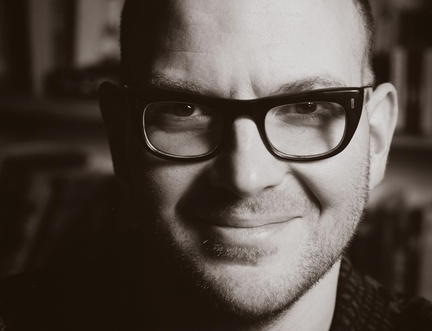The Freedom to Configure
By Cory Doctorow

In 2018, we commissioned 51 authors from 25 countries to write essays exploring ideas about freedom for The Freedom Papers, a publication produced in partnership with Gutter Magazine. Read on for Cory Doctorow's essay, and visit guttermag.co.uk to purchase a copy of The Freedom Papers.
Today we are in the midst of a great techlash in which the giants of Big Tech are being threatened with regulation that will constrain how they relate to us.
The techlash has come, and not a moment too late, because it is indeed the case that Big Tech has a big influence: the errors in judgment and moral blind-spots of a tiny handful of technologists and executives have far-reaching implications for the lives of billions of people.
I think that regulators are right to identify tech companies as a source of social mischief, but I think that their response is misguided – or at least, incomplete.
It’s well and good to tell Facebook how it may use the data it collects on us; or to order Apple not to discriminate unfairly when deciding who may sell apps for iPhones; or to impose a duty of fairness upon Google in its search rankings. It’s another thing to make it stick. Like financial regulations that limit how companies may arrange their finances, technology regulations rely on auditing to detect violations, and if you think making sense of the deliberately obfuscated ledgers of tax-dodging multinationals is hard, wait until you try to figure out whether Facebook’s self-modifying machine learning systems are conducting themselves in accord with the fairness principles set out in statute, or whether Google is honouring its duty to keep data about Europeans on EU servers.
To rein in Big Tech, we must return to its origins. Before Google, Apple and Facebook were colossi, they were scrappy start-ups, and they deployed techniques that were once the bedrock of taming technology and today are considered a form of theft at best, and terrorism at worst.
When Google wanted to know the shape of the web, it went out and took a copy of every webpage in the world. When Facebook wanted to lure people away from the incumbents like Myspace, it offered those users a tool to scrape the messages from their Myspace pages and bring them into Facebook, giving them a bridge that allowed them to gracefully transition from one community to the next. When Apple wanted to convert Microsoft Windows users to Mac OS users, it created the ‘Switch’ campaign, with a suite of applications that reverse-engineered Microsoft's flagship Office product, so that Mac users could open, read, and save Microsoft Office documents without using Microsoft’s products.
Today, Google takes extreme technical countermeasures to stop its competitors from scraping its pages. Facebook successfully sued Power Ventures, a competitor that offered Facebook users a much more modest version of its Myspace migration tool to help them give up on Facebook. Apple has repeatedly intervened in US Copyright Office hearings to argue that it should be illegal to ‘jailbreak’ your iPhone and install apps that Apple hasn't approved.
The programmers who made the tools that felled the previous generations of tech giants were not sorcerers doing something that few could replicate. Nor were they making tools that only benefited the technical elites, leaving everyone on the wrong side of the digital divide to take what the old guard was dishing out with no choice in the matter. Software tools are not like hammers or saws; they're more like self-executing recipes, encapsulating the expertise of skilled tool smiths into little code-robots that will run on behalf of anyone, no matter how technologically clued-in they happen to be.
The current tech giants are different, but it's not a technological difference, it's a political one. It's not harder to make a Facebook-taming tool than it was to make a Myspace-taming tool: it's just riskier, because Big Tech has gamed the regulatory system, ensuring that any rules that were introduced to rein it in included rules that banned their users from reconfiguring them. If Google or Apple are legally required to design their products to operate in specific ways and forswear certain features, then anything a user (or competitor) does to change how these products work endangers that rule.
We will never tame Big Tech until we restore what Aram Sinnreich calls the ‘right to configure’ – the right to change how our technology works. It's not enough to ban making phones that spy on us: we also must have the right to alter our phones so that they can’t spy on us.
Configurability – the right to rearrange the things that are important to us, even when the people who made those things object – has a long and honourable tradition in the nontechnical realm. Parody, satire, news reporting and criticism depend on the ability to quote, refashion, and restructure to make our points.
In the tech domain, the right to configure is the right to seize the means of information.
My 2017 novel Walkaway explores intentional communities of economic refuseniks who use reconfigured code – some freely given, more stolen or borrowed – to ‘live as though it was the first days of a better nation.’ They create automated systems of luxury, in which machines do the heavy lifting that once divided us into the overclasses and underclasses, and devote themselves to leisure and politics rather than the dull business of cleaning and repairing.
People who’ve read the novel with a critical eye have taken note of the fact that the majority of protagonists in the story are technically minded: tool smiths and engineers and hackers and scientists (your basic science fiction protagonists, in other words) and asked what happens to everyone else?
There are, in fact, a fair number of characters who are ‘nontechnical’ in that they are using, rather than crafting, technology – but everyone in this world is reconfiguring technology. If they're not making tools, they’re certainly using them – using them to remake the world around them, to demand more than what they're given.
To seize the means of information.
Copyright © 2018, Cory Doctorow. All rights reserved.
Supported by the Scottish Government’s Edinburgh Festivals Expo Fund through Creative Scotland.
Look, Listen & Read
- 2026 Festival:
- 15-30 August
Latest News
 Major new partnership with Celtic Connections
Major new partnership with Celtic Connections




